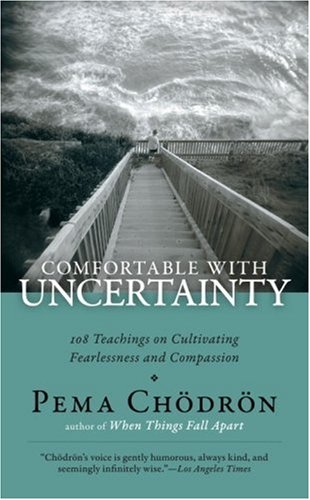Pema Chodron is resident teacher at Gampo Abbey, Cape Breton, Nova Scotia, the first Tibetan Buddhist monastery in North America established for Westerners. She is the author of The Wisdom of No Escape, Start Where You Are, When Things Fall Apart, and The Places That Scare You. In this top-drawer work, Emily Hilburn Sell has compiled and edited 108 excerpts from Chodron's books that illustrate the art of resting in uncertainty or what is known as living the openness of the present moment and being available to others.
These teachings offer key insights into ways to soften the heart. A central one is sitting meditation. Another is mind-training, which in the Tibetan Buddhist tradition includes tonglen meditation and the use of slogans to combat self-centeredness. Chodron also covers the aspiration practices of the four limitless qualities: loving-kindness, compassion, joy, and equanimity. By activating these possibilities in ourselves, we can engage in what the author calls "the six ways of compassionate living": generosity, patience, exertion, meditation, and wisdom. This path, which is known as bodhisattva activity, has been called in Shambhala teachings the path of warriorship.
Chodron sees sitting meditation as a practice that helps us to stay with our thoughts, to be open to our vulnerability, to live in the present moment, and to lighten up. She is convinced that the four limitless qualities "are powerful tools for dissolving the barriers that perpetuate the suffering of all beings." Chodron celebrates compassionate activity with the following words: "It's daring not to shut anyone out of our hearts, not to make anyone an enemy. If we begin to live like this, we'll find that we actually can't define someone as completely right or completely wrong anymore. Life is more slippery and playful than that. Trying to find absolute rights and wrongs is a trick we play on ourselves to feel secure and comfortable."
Perhaps the most memorable passages in this anthology are those in which Chodron explains or ponders the profound meanings of the 59 slogans, all of which come across as exercises to reverse the ego's logic. For instance, take "drive all blames into one." This practice means owning the blame instead of always pointing the finger at others. "Abandon any hope of fruition" challenges us to stop trying to control the future or acting in such a way as to insure things go our way. "Don't expect applause" is a very difficult one since we've all been taught to take credit for making good things happen. The point is to practice kindness and generosity without any hope of recognition or reward. Chodron really hits the bull's eye with her commentary on the slogans. They are essential tools for the spiritual warrior in a world of difficulties, disappointments, surprises, and constant change.
